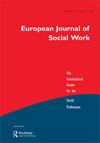编辑
IF 1.6
3区 社会学
Q2 SOCIAL WORK
引用次数: 0
摘要
在2023年第二期中,我们强调儿童和家庭社会工作是社会工作作为实践和学术研究领域活跃的众多领域之一。在谈论儿童和家庭社会工作时,对家庭干预的研究,从0岁的孩子到18岁的年轻人,都是核心。这里的观点是,家庭是一种社会结构,它是由历史和社会发展共同塑造的。这也意味着家庭不能脱离更广泛的社会和政治讨论。例如,如果我们看一下将早期儿童教育作为儿童和家庭社会工作一部分的理念我们会发现婴儿死亡率,在19世纪末非常高甚至超过20%,发挥了重要作用。就其本身而言,这在当时既不令人惊讶,也不新鲜。然而,人们突然更加关注人口的健康,包括儿童的健康。这不仅是因为民族国家的形成以及随之而来的军队对人力的需求,还有其他原因,还因为工业化确保了大量的经济繁荣,未来的工人需要得到保护,免于疾病和死亡。这些社会发展(民族国家的形成和工业化)最终也被援引为建立儿童保育倡议的合法性,因为儿童死亡率被视为主要发生在穷人中的问题。资产阶级建立的儿童保育计划旨在满足这一需求,同时教会穷人如何最好地抚养孩子,并为他们的晚年生活做好准备,包括参与劳动力市场。把孩子当作未来资本的想法第一次出现在这里。在本期中,我们将讨论影响儿童和家庭社会工作的一些历史和社会结构。通过这种方式,我们希望强调历史和社会发展对当代社会工作讨论和实践的重要性。我们祝您阅读愉快,并期待在不久的将来收到您的投稿。本文章由计算机程序翻译,如有差异,请以英文原文为准。
Editorial
In the second issue of 2023, we highlight child and family social work as one of the many domains in which social work as a practice and as an academic research field is active. In talking about child and family social work, the study of interventions in families, ranging from children as young as zero to young adults as old as 18, is central. The idea here is that the family is a social construct that it is coshaped by historical and societal developments. This also means that the family cannot be separated from broader social and political discussions. For example, if we look at the ideas that have shaped early childhood education as part of child and family social work we see that infant mortality, which was very high at the end of the nineteenth century and even exceeded 20%, played an important role. In itself, this was neither surprising nor new at the time. Nevertheless, more attention was suddenly paid to the health of the population, including (young) children. This was not only because of the formation of nationstates and the accompanying need for manpower for the army, among other things, but also because industrialisation ensured a lot of economic prosperity and future workers needed to be safeguarded from illness and mortality. These societal developments (the formation of nation-states and industrialisation) were eventually also invoked as a legitimisation to set up childcare initiatives because child mortality was seen as a problem occurring mainly among the poor. The childcare initiatives established by the bourgeoisie aimed to meet this and would at the same time teach the poor how best to raise their children and prepare them for later life, including labour market participation. The idea of children as future capital came around the corner for the first time here. In this issue, some of these historical and social constructions that shape child and family social work are discussed. In this way, we hope to highlight the importance of historical and societal developments for contemporary discussions and practices in social work. We wish you much reading pleasure and look forward to receiving your contribution in the near future.
求助全文
通过发布文献求助,成功后即可免费获取论文全文。
去求助
来源期刊

European Journal of Social Work
SOCIAL WORK-
CiteScore
3.50
自引率
20.00%
发文量
96
期刊介绍:
The European Journal of Social Work provides a forum for the social professions in all parts of Europe and beyond. It analyses and promotes European and international developments in social work, social policy, social service institutions, and strategies for social change by publishing refereed papers on contemporary key issues. Contributions include theoretical debates, empirical studies, research notes, country perspectives, and reviews. It maintains an interdisciplinary perspective which recognises positively the diversity of cultural and conceptual traditions in which the social professions of Europe are grounded. In particular it examines emerging European paradigms in methodology and comparative analysis.
 求助内容:
求助内容: 应助结果提醒方式:
应助结果提醒方式:


